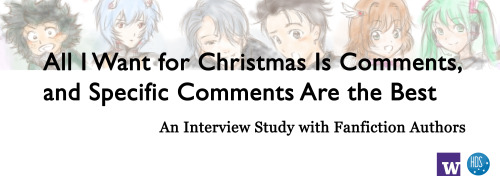Originally posted on August 17, 2019 at https://fanfictiondatascience.tumblr.com/post/187081781905/in-january-and-february-2019-our-research-group.

In
January and February 2019, our research group did an interview study on
how fanfiction authors seek feedback for their fiction. We interviewed
29 fanfiction authors and learned about their insights on feedback and
relationship with feedback providers. In this blog post, we are going to
talk about our findings on the impact of public comments, and the
particular positive outcomes of comments that contain specific thoughts
and insights.
Comments Are Generally Valued
Fanfiction authors appreciated public comments on their works. “All I want for Christmas is comments, if you liked it please let me know,” (P2)
one of the authors we interviewed once wrote in her author’s note. All
kinds of comments are welcomed as long as they are conveyed in a
friendly and respectful tone.
Concise positive comments, such
as “wow”, “amazing”, “awwww this is so cute”, though simple and maybe
not that informative, are still valuable to authors. Those comments “tell you that you’re hitting the right emotional chords, that you’ve been on the right track” (P21). “That’s really helpful.” One author said:
“If there’s a session where you’re getting absolutely none of that, that might prompt you. Like okay, I meant that to be really eliciting a certain emotional response and it wasn’t getting it, so that might also be a sign to go in and kind of work on that” (P21).
Comments Help New Authors Enter the Community
Comments
were especially valuable to new writers in the fandom. They made
authors feel welcomed in the community, and helped authors learn about
community norms and writing styles. One author told us that when they
posted their first work in a new fandom, comments helped them get
connected in the new community:
“You enter into new fandoms, you’re writing for a new audience and you don’t really know anyone… I don’t really know the rules of this particular fandom and I don’t really know what people are going to think of my stories is going to fit. And that initial bit of support and positive feedback to get that on early works, and to feel, okay, I’ve just sort of arrived in this in this fandom, and in this community, but people are making me feel welcome, and making me feel like what I’m writing is valued and appreciated by people” (P1).
Specific Comments Are Particularly Appreciated
While
in general all kinds of comments were welcomed, almost all of the
authors we talked to expressed particular appreciation for comments in
which the reader expressed opinions and thoughts about particular
aspects of the story. One author talked about how she formed a personal
practice to write substantive comments when reading others’ fictions:
“I try to copy certain lines while I’m reading and try to leave a substantial comment… and say I really liked your story because of ZYX…I do both because I’ve been writing fanfiction for a long time and I know it’s fun to have substantial comments. I do it because that’s what I like and I know it can make someone’s day” (P29).
Authors recognized the effort that readers put into substantial comments, so they regarded receiving those long specific comments as an honor:
“You don’t write a big long comment like that, if you’re not affected by something. Because it’s hard enough to get readers to click the Kudos button and just give me a little heart, let alone write a comment, let alone write a long detailed comment whenever that happens” (P14).
Specific Comments Recognize Authors’ Effort
Many
authors mentioned that receiving long and specific comments made them
feel that their effort had been recognized. When they were proud of a
part of their story in particular, they liked to hear about whether the
emotion and thoughts that they tried to convey impacted readers in the
way they expected.
“It just feels great when I spent so much time working on something and working on a particular detail, I absolutely love hearing someone’s reaction to it, like, what specifically they liked about it… It’s great getting those compliments but I want to know about their experience living in the story that I’ve created” (P2).
“The most interesting and in depth sort of feedback, people really seem to connect with the characters and the characterization of the story and the writing of the story, which I really, really like. It’s very satisfying when you put a lot of effort into something and they actually noticed and they’re like, and they comment on it like, oh my God, the way you wrote this, the flow of it, the thing… that’s my own kink, hearing people say that they understood what I was writing and that they understood what I was going for” (P14).
Specific Comments Teach Authors about Writing
Being able to hear what the audience thought about their fiction was not only a joyful experience to fanfiction authors, but also a valuable learning opportunity. Authors learned from specific comments about whether their writing style and the direction of the story worked for their readers. Some regarded specific comments as feedback for parts of their writing that they were not sure about. One author told us they endured writer’s block when writing a certain character in their story. When they received positive comments on that character,
“they were commenting on my characterization for the character. And I was like ‘oh, thank you god,’ because I struggle with this particular character a lot” (P20).
The author was able to validate their writing from comments that specifically pointed to a characterization.
Specific Comments Connect Readers and Authors
Another
important benefit of specific comments was that it fueled connection
with readers. Specific comments elicited discussion between authors and
readers. As one author said in the interview:
“I like having comments that are thoughtful and trying to analyze what I wrote, and are picking up what I put down basically… I usually respond to the comment and say thank you, and if they left analysis I talk back and forth” (P29).
These back-and-forth discussions lead to further connections outside the specific story.“I’ve
made friends with a lot of people who started out just commenting on my
fics a lot. You end up commenting back, and start talking” (P13). In some cases, these connections developed into later beta reading relationships and friendships. “Most of the people that I sent work to… they’ve made comments that are the right sort of comments I suppose…” one author said while telling us the story of meeting her beta readers,
“and so I sent work to them after that sort of built up a bit of a relationship by then so that I know what sort of person they are and what sort of comments they might make… I know that if I sent it to them, they will be looking for the sorts of things that I’m looking for them to look for. The comment that they’ve made tells me that they’re reading it the way I want a beta reader to read it” (P26).
Summary
Our
findings about public comments suggest that it is more than valuable
for fanfiction authors to receive comments, especially comments that
provide thoughts and insights on specific aspects of the story and
writing. We suggest that encouraging exchange of specific public
comments will be beneficial to fanfiction communities.
We are actively posting blog posts about other findings from our interview study. Check out our blog later for more findings!


